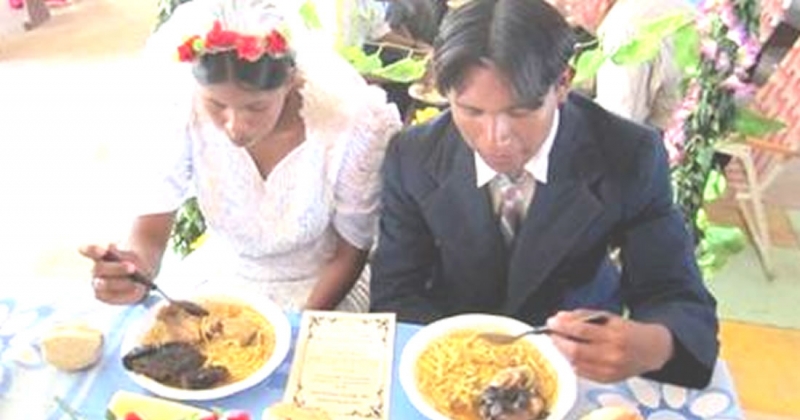To buy her soap--'til death do us part

The long-awaited day had finally arrived. Missionaries to Paraguay Jamie and Char Hunt sat in attendance at the wedding ceremony. The young couple had planned a blending of their own culture into a western-style wedding, requiring months of planning and significant financial cost.
Those attending the wedding sang as the bride walked down the aisle. A young “cake-bearer” led the way. In many ways, the wedding was similar to many other weddings they had attended.
Then it was time for the vows.
“Do you, (bride), take (groom) to be your husband? Do you promise to cook for him and to his laundry … ‘til death do you part?”
To this, the bride shyly replied, “I do.”
“And do you, (groom), take (bride) to be your wife? Do you promise to buy her soap so she can do your laundry, food so she can cook for you and to buy her a skirt if she needs one … ‘til death do you part?”
To which the groom responded, “I do.”
Then, “You make shake the bride’s hand. You are married.” And at this point, the Hunts say, the couple shook hands and joyfully turned to face their well-wishers.
The Hunts say their initial response was “a touch of flabbergastation.” Amazed, they thought, “Really? The wife promises a life of hard manual labor and the man’s only promise is to make sure she has what she needs to complete those back-breaking tasks … with an occasional skirt to sweeten the deal.” It seemed to Jamie and Char that the scales were tipped quite significantly in favor of the groom.
But then they re-evaluated. There was that very large factor of culture to consider. And considering the setting of culture, the vows started to make a lot of sense.
The local people highly respect young women who display their clean laundry hanging around their yard. If a young husband is forced to take his laundry to her mother, his wife will be ridiculed. With cooking it is much the same. A young wife is highly thought of if her husband’s stomach is always full. This must indicate that she always has his meals waiting for him when he comes in from working in the fields.
The Hunts share, “The young groom, in promising to provide soap and food for his wife, was ensuring that his bride would be accepted and praised among her people, thus saving her from great shame. In their culture, this would be true love.”
Jamie and Char observe, that it would be very easy to conclude untrue things about the bride and groom if they failed to view their vows through the tribal worldview and value system.
“Sadly,” they say, “something very similar has happened in the spiritual lives of many local people. They have concluded wrong and untrue things about their Savior because there are gaps in their understanding about the character of God and His promises to His Bride. Many are trying to appease God through the outward display of different ‘acts of Christianity’ in hopes of attaining good health, prosperity and even salvation.”
Pray that God will continue to equip Jamie and Char Hunt with a deep understanding of tribal culture and language. Pray that He will enable them to help their local friends to see Jesus, the Bridegroom, for Who He really is and to understand the deep love He has for them.
